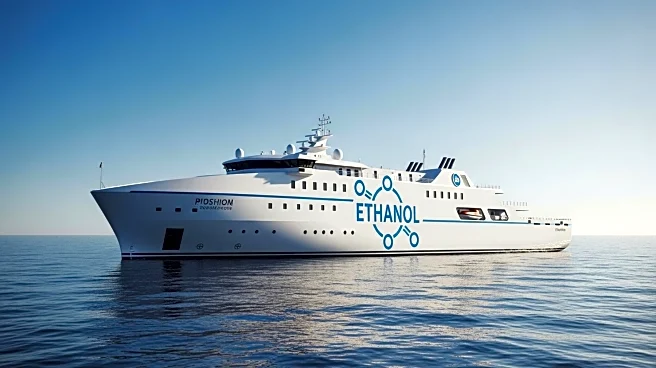What's Happening?
The Global Ethanol Association (GEA) has launched as an independent, non-profit organization headquartered in Switzerland. Its first major initiative, the Marine Fuel Sector Initiative, aims to establish ethanol as a key component of the sustainable marine fuel mix. The U.S., being one of the largest ethanol producers, is positioned to benefit from this initiative by accessing competitively priced, low-carbon fuel. Ethanol offers advantages such as wide availability, competitive pricing, compatibility with existing methanol dual-fuel marine engines, and low lifecycle emissions. The initiative is supported by organizations like the International Bunker Industry Association and countries like Brazil, which are working to integrate ethanol-specific safety and operational considerations into marine fuel standards.
Why It's Important?
The initiative by the Global Ethanol Association could significantly impact the maritime industry by providing a sustainable alternative to traditional marine fuels. Ethanol's lower lifecycle emissions and clean combustion make it an attractive option for shipowners looking to reduce their environmental footprint. The U.S. stands to gain economically by leveraging its existing ethanol production infrastructure to meet maritime demand. This shift towards ethanol could also drive innovation in marine engine technology and fuel logistics, potentially leading to broader adoption of low-carbon fuels across the industry. The initiative aligns with global sustainability mandates and regulatory frameworks like the EU Emissions Trading System, which incentivize the use of low-carbon fuels.
What's Next?
The Global Ethanol Association is in discussions with ethanol producers to establish green corridors for ethanol bunkering, connecting production hubs with strategic trade lanes. These corridors will facilitate early deployment and showcase ethanol's scalability as a marine fuel. Shipowners, engine makers, and other stakeholders are conducting trials to ensure ethanol can be integrated into existing methanol dual-fuel platforms. The Association is actively seeking new members across the value chain, including shipowners, ethanol producers, and marine fuel traders, to support the initiative and accelerate the adoption of ethanol in the maritime sector.
Beyond the Headlines
The adoption of ethanol as a marine fuel could have broader implications for global shipping practices and environmental policies. Ethanol's favorable safety profile compared to methanol may lead to changes in safety regulations and operational protocols. The initiative could also influence international trade dynamics by creating new market opportunities for ethanol producers and reshaping fuel supply chains. Additionally, the focus on sustainable fuels may drive further research and development in alternative energy sources, contributing to long-term shifts in energy consumption patterns within the maritime industry.










![Cortisol vs. Melatonin: The Biological War Happening Inside Every Night-Shift Worker]](https://glance-mob.glance-cdn.com/public/cardpress/binge-magazine-card-generation/spaces/US/en/discover-daily/images/ppid_7byehtbd-image-177082393426031154.webp)